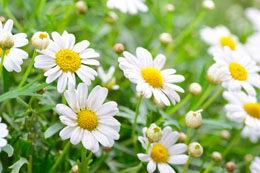As per flower symbolism, the accepted meaning of a daisy is purity and innocence. You will also come across other meanings of daisy flower in different sources. Read on to learn more regarding daisy flower types, meaning and facts.

The name daisy is derived from the words 'day's eyes', owing to the fact that this star-shaped flower opens during the daytime and closes at night. The floral language or flower meaning has evolved many generations, so is the meaning of daisy flower. In this article, we will try to learn different types of daisies, daisy flower meaning, and interesting facts about this lovely bloom.
Daisy Flower Types
Daisies belong to the family
Asteraceae (sunflower family), which is the largest group of flowering plants. As of date, more than 12,000 species of daisy with different flower color, size, and shape are identified. Some are naturally adapted in wild pastures and woodlands, while other varieties are grown in home gardens for aesthetic purposes. Popular types of daisy flowers are given below.
- Common or English daisy (Bellis perennis)
- Gerbera daisy
- Blue daisy
- Prairie daisy (or lazy daisy)
- African daisy
- Zulu princess daisy
- White button daisy
- Shasta daisy
- Giant daisy
- Sunshine daisy
- Painted daisy
- Marguerite daisy
- Gloriosa daisy
Daisy Flower Meaning
Who said flowers cannot speak, they silently exchange thoughts better than verbal communication. Whether grown in wild or planted in flower gardens, a daisy flower has long been appreciated for its simple beauty. Like every flower known to us, this delicate bloom has a meaning of its own. And the amazing part about daisy bloom is that meanings gathered from different sources are all optimistic. But the most accepted daisy meaning is purity and innocence. In some sources, you will also find the meaning of daisy flower as loyal love, patience, beauty, and even 'secrecy between two persons'.
In earlier days, maidens wore daisy flowers to decorate their hair, which symbolized simplicity and innocence of youth. Also, there was a time when a daisy flower gifted by a maiden was considered a sign of affection and respectable gesture. Till today, the daisy bloom is used to express the language of love in a special way. It is commonly related to the fifth wedding anniversary and also, a bouquet of daisies is given to a new mother to welcome the newborn baby. No wonder, lovers have also gifted daisies to each other as a token of their undying love!
Daisy Flower Facts
- The peak blooming season for daisies is summer, when thundershower occurs very often. Hence, this perennial flower is also known as 'thunder flower' in some regions.
- Daisy plants are propagated either by cuttings or from seeds. The former is carried out in spring, while the daisy seeds are best sown in late autumn or spring.
- Daisy plant exhibits a spreading or prostrate growth habit. The flower stalks are about 3 - 4 inch long, which is more than the leaf length.
- A perennial plant by nature, dark green daisy leaves are arranged in a rosette like fashion to the main stem and they beautify the garden even in off blooming season. The foliage is edible too.
- In a daisy bloom, there are two types of flowers - ray florets (colorful petal like flowers that occupy the peripheral portion) and disc florets (small flowers arranged in the center).
- The variety, English daisy is often found growing in wild habitat. In the northwest United States, it is considered an invasive weed that requires timely control.
- It is believed that daisy flower prevents lightning. Hence, some people grow and maintain daisies as indoor plants.
So, this information was all about daisy flower. You can grow daisies in your garden to enjoy the vivid colored, star-shaped blooms. Do not miss a chance to gift this delicate bloom to your beloved ones and express your genuine feeling for them!






 The name daisy is derived from the words 'day's eyes', owing to the fact that this star-shaped flower opens during the daytime and closes at night. The floral language or flower meaning has evolved many generations, so is the meaning of daisy flower. In this article, we will try to learn different types of daisies, daisy flower meaning, and interesting facts about this lovely bloom.
The name daisy is derived from the words 'day's eyes', owing to the fact that this star-shaped flower opens during the daytime and closes at night. The floral language or flower meaning has evolved many generations, so is the meaning of daisy flower. In this article, we will try to learn different types of daisies, daisy flower meaning, and interesting facts about this lovely bloom.